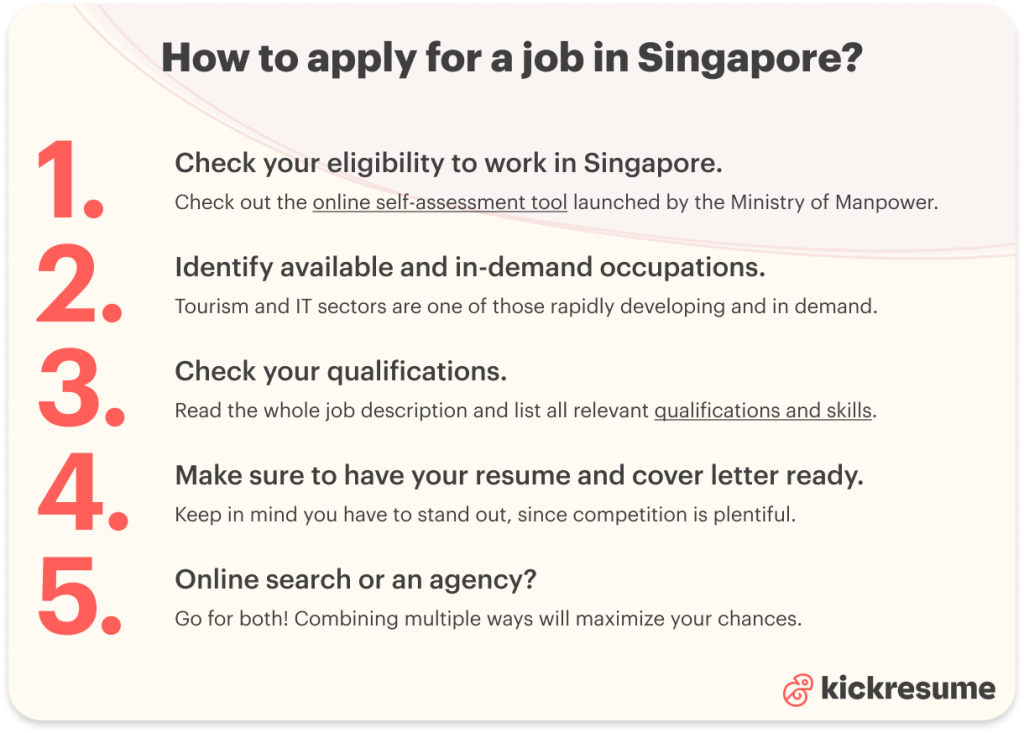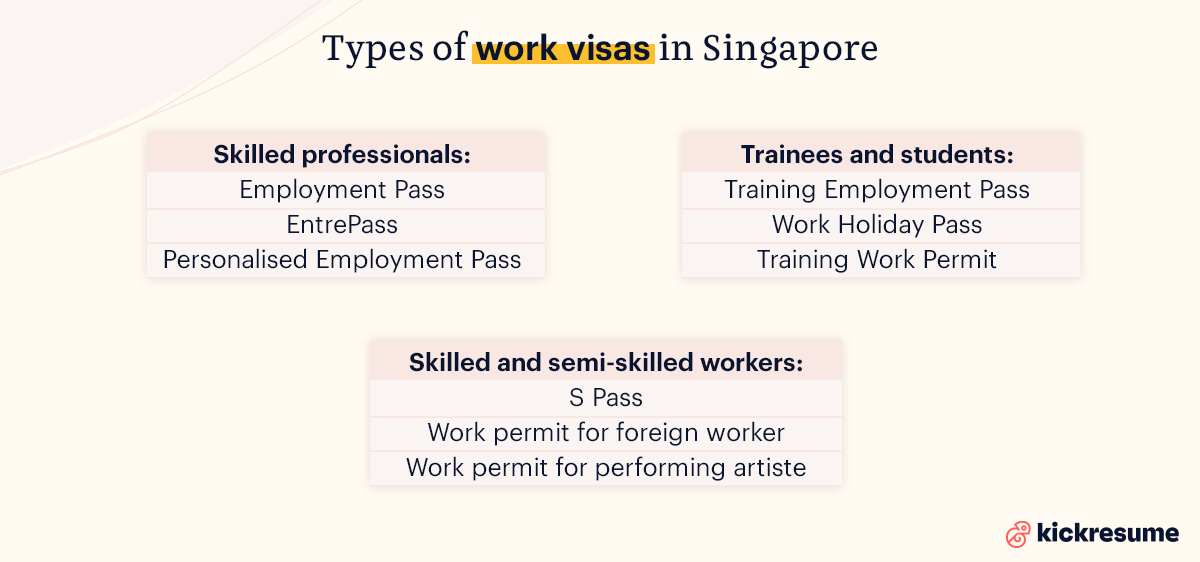Despite being small, Singapore has emerged as one of the world’s most prosperous countries. Its status as the largest port in Southeast Asia means that Singapore is a financial center and remains one of the busiest cities in the world.
No wonder so many people are asking themselves “How do I find a job in Singapore as a foreigner?”.
This being said, Singapore has a very competitive job market, especially if you’re a foreigner. Hence, finding a job here can be a challenge.
Anyway, welcome to our complete guide on how to get a job in Singapore as a foreigner. We're also going to answer some of your FAQs concerning employment opportunities in Singapore.
- Is it easy to get a job in Singapore?
- How to apply for a job in Singapore?
- Work visa in Singapore
- Resume and cover letter tips
- Job search engines in Singapore
- Volunteer jobs for foreigners in Singapore
- Summer jobs in Singapore for foreigners
- American companies hiring in Singapore
- Salaries in Singapore
- Coronavirus-related information for foreigners looking for a job in Singapore
Is it easy to get a job in Singapore?
Well, finding a new job is generally a daunting challenge. In Singapore, the market is highly competitive and even experienced professionals may find it difficult to succeed.
On the other hand, in an economic hub like Singapore the job-market is never saturated. Moreover, Singaporean companies are familiar with hiring foreign labor, since this small country is a multicultural melting pot.
Here are a few tips that will make your job hunting process in Singapore easier:
- Focus on in-demand industries. Like in every other country in the world, some industries are rapidly growing, while others have reached a point of stagnation. Tourism and IT sectors are one of those rapidly developing and in demand, but there’s plenty more. To find out which occupations and skills-sets are in demand, check out the Singaporian Ministry of Manpower website.
- Familiarize yourself with local employment practices. It's a good idea to check whether Singapore's common employment practices fit for your lifestyle before committing to work here. Pay closer attention to work hours, absences and holidays. Singapore's Ministry of Manpower has a list of employment practices that can give you a better idea of what working in Singapore is like.
- Research online job portals. Looking and applying for a job online is a common practice nowadays and remains one of the best ways to look for open positions in Singapore. If you scroll down, you can find a separate section on job search engines in Singapore with links.
- Don't forget to get your visa. You've got are multiple options for getting a work visa (otherwise known as an employment pass) in Singapore. We discuss them in more detail in a separate section.
- Familiarize yourself with the Singaporean culture. It may come in handy when doing interviews. Employers may be more prone to hiring you if they know you will be a good cultural fit.
If you'd like to stay in Asia but prefer a different place, check out: How to Find a Job in Japan as a Foreigner. Or maybe Asia isn't the right place for you. What about Canada, though?

How to apply for a job in Singapore?
There are certain steps you are required to take before applying for a job in Singapore as a foreigner, so make sure you're well prepared.
- Check your eligibility to work in Singapore. To save yourself the trouble of going through an exhaustive process of searching for a job and then finding out you're not eligible, check out the online self-assessment tool launched by the Ministry of Manpower in Singapore.
- Identify available and in-demand occupations. As mentioned before, getting a job in Singapore really depends on how well you can navigate the job market. Especially since you're a foreigner.
- Check your qualifications. Make sure you read the whole job description and list all relevant qualifications and skills. If you don't, they'll likely prioritize someone who does.
- Make sure to have your resume and cover letter ready. It goes without saying, but having a great resume and cover letter is a must. Keep in mind you have to stand out, since competition is plentiful. More details about resume and cover letter specific to Singapore are in a separate section.
- Online search or an agency? Go for both! Combining multiple ways will maximize your chances of finding a job.

Work visa in Singapore
Once you've secured a job, you can begin to deal with the more practical side of moving to Singapore. One of the most important steps is to apply for a work visa. This will allow you to live and work in Singapore. But how do you get the work visa? And what are the different types of visas?
There are different types of work visas depending on what qualifications you have or how skilled you are. Here's a quick breakdown. Make sure to click on the links below to get more details from the Singapore Ministry of Manpower website.
Types of work visas in Singapore
1. Skilled professionals
- Employment Pass: For foreign professionals, managers and executives. Candidates need to earn at least $4,500 a month and have acceptable qualifications.
- EntrePass: For eligible foreign entrepreneurs who are keen to start and operate a business in Singapore that is venture-backed or possesses innovative technologies.
- Personalised Employment Pass: For high-earning existing Employment Pass holders or overseas foreign professionals. The PEP offers greater flexibility than an Employment Pass.
2. Skilled and semi-skilled workers
- S Pass: For mid-level skilled staff. Candidates need to earn at least $2,500 a month and meet the assessment criteria.
- Work permit for foreign worker: For semi-skilled foreign workers in the construction, manufacturing, marine shipyard, process or services sector.
- Work Permit for performing artiste:For foreign performers working in public entertainment outlets such as bars, hotels and nightclubs.
3. Trainees and students
- Training Employment Pass: For foreign professionals undergoing practical training. Candidates must earn at least $3,000 a month.
- Work Holiday Pass (under Work Holiday Programme): For students and graduates aged 18 to 25 who want to work and holiday in Singapore for 6 months.
- Work Holiday Pass (under Work and Holiday Visa Programme): For Australian students and graduates aged 18 to 30 who want to work and holiday in Singapore for 1 year.
- Training Work Permit: For semi-skilled foreign trainees or students undergoing practical training in Singapore for up to 6 months.
Click here to find out more about the types of visas mentioned on the Ministry of Manpower website, including visas for family members and the exemptions for working while on visit pass.

Resume and cover letter tips
For your resume
- Tailor your resume. You're unlikely to succeed by submitting a generic, non-specific resume. Ditch the one you've made for your last job in your home country and create a new resume, focusing on the skills and qualifications listed in the job description. Make your resume tailored to each job and company you decide to approach.
- Include references. Asking a trustworthy person to attest to your skills and achievements is a great way to give your professional experience extra weight. It may even set you apart from other applicants. If you're not sure who to ask and how, check out our guide with email templates.
- Don't include basic IT skills. In a job market as competitive as Singapore, it is automatically assumed you can work with computers.
- Don't inlude your photo. Including a photo on a resume is different for every country. In Germany and China, a photo is usually expected. However, in Singapore photos on resumes are a big no-no.
For your cover letter
- Convince the hiring managers that you're the right fit.
- Stay focused on the right job, not just any job in Singapore.
- Use similar structure as you would for the UK job-market.
- Try not to use clichés and vague, generic language.
- Not sure if your cover letter is good enough? These cover letter samples will help.
Job search engines in Singapore
We have compiled a list of the best job search engines in Singapore. If you're asking how to find a job in Singapore as a foreigner ― this is a good place to start your job search!
- JobsDB. Singapore's most popular job search website. A great thing about this one is that you can specify the area where a company you like is based to avoid a time-consuming commute.
- JobStreet. The second biggest job search engine competing with JobsDB for the lead. You can use a variety of filters, such as location or minimum salary.
- STJobs. Owned by Singapore Press Holdings, STJobs offers a vast number of listings across a wide range of industries.
- Monster. The world's most popular job search website allows you to search among many jobs offers in Singapore. You can also upload a resume to your profile, which makes it easier for hiring managers to contact you. They've got a mobile app too!
- MyCareersFuture. This site is run by the Singaporean government, which means it is very rare for any scams to appear on the website.
- GrabJobs. A cost-effective recruitment solution that automates sourcing, screening, and interviewing of candidates. With over 5,000 companies using the job platform to simplify their hiring process, it’s becoming a popular choice amongst job-seekers from all around the world. On Grabjobs, you'll have your profile automatically generated for you. Additionally, you can also apply for new jobs in under a minute. This can be done with the automated chat-bot pre-screening interviews!
Volunteer jobs for foreigners in Singapore
People all around the world do volunteer work for all kinds of reasons. These include eradicating poverty, improving educational conditions, and helping wildlife conservation. Moreover, volunteering is always a great way to boost your career outlook.
Even though Singapore is a small area, there are many volunteering programs for foreigners. The GoOverseas portal offers volunteering programs in Singapore, such as animal conservation & research program, youth and orphan care program, and many more.
Alternatively, the volunteer.gov.sg site lets you connect with agencies or schemes that align with your interests and support the causes that are close to your heart.
Lastly, make sure you have all the technicalities sorted before you apply for a volunteering program to ensure you have a work permit and everything is legal.
Summer jobs in Singapore for foreigners
Since the country is a tourist hotspot, you might be able to find a summer job related to the hospitality sector. For example in hotels, hostels, pubs, and restaurants.
The Singapore Work Holiday Programme that I've mentioned above allows university students and recent graduates from eight countries to work in the country for up to six months on a holiday visa. These countries include: Australia, France, Germany, Hong Kong, Japan, Netherlands, New Zealand, Switzerland, United Kingdom or United States.
Moreover, on Glassdoor you can search for summer jobs in Singapore by filtering the conditions. You can also use a filter regarding the wage and area. So don’t waste any more time and find a job in Singapore!
American companies hiring in Singapore
Can Americans work in Singapore? Of course they can. There’s a big pool of jobs in Singapore for Americans.
According to CNBC, all of Singapore’s top employers of 2020 are international firms, while 8 of the leading 10 are headquartered in the United States. These include major names from industries such as banking, oil, gas, and insurance.
Here we list American companies with branches in Singapore, which are constantly looking for spots to fill. Plus, they’re all on Glassdoor’s inaugural report on “best places to work in 2020 in Singapore.”
Salaries in Singapore
Singapore has some of the highest wages in the world. After all, 5% of Singaporeans belong to the world’s richest 1%.
So, how much money does a person working in Singapore actually make?
It is important to mention that it depends on factors such your education, the skills and qualifications you have, as well as the industry. The experience level is the most important factor in determining the salary.
- Salary range in Singapore. Salaries vary from 2 140 SGD (1,590 USD) per month (minimum salary) to 37,700 SGD (28,020 USD) per month. However, it’s the maximum average salary, so your actual salary can be even higher.
- Median salary in Singapore. The median salary in Australia is 8,790 SGD per month (6,534 USD), which means that 50% of people in Singapore lie in the first and second quartile and thus, make less money. Meanwhile, 50% of people have a higher salary 8,790 SGD per month.
Highest paying careers in Singapore
Here we list the top 5 highest paying careers in Singapore with the average monthly salary, according to SalaryExplorer.
- Surgeons and doctors. Earning on average 31,400 SGD per month.
- Judge. With an average monthly salary of 26,400 SGD.
- Lawyer. Unsurprisingly, lawyers earn on average 21,400 SGD per month.
- Bank manager. Earning on average 20,100 SGD per month.
- Chief executive officer. With an average monthly salary of 18,900 SGD.
Coronavirus-related information for foreigners looking for a job in Singapore
The Covid-19 epidemic is currently having a significant influence on many aspect of our existence. As a result, the process of looking for a job in Singapore is currently a bit more difficult.
All pass holders (work pass holders and dependants) must get entry approvals from the relevant government agencies to enter Singapore. Employers will need to submit a request for a worker's entry approval.
Click here to read the FAQs about COVID-19, such as general guidelines, precautionary measures, flexible work arrangements, and entry approvals on the Ministry of Manpower Singapore site.




